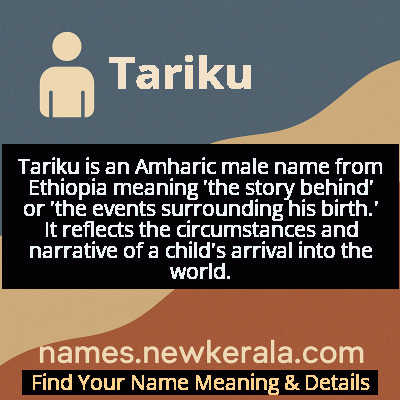Tariku Name Meaning & Details
Origin, Popularity, Numerology Analysis & Name Meaning of Tariku
Discover the origin, meaning, and cultural significance of the name TARIKU. Delve into its historical roots and explore the lasting impact it has had on communities and traditions.
Name
Tariku
Gender
Male
Origin
African
Lucky Number
8
Meaning of the Name - Tariku
Tariku is an Amharic male name from Ethiopia meaning 'the story behind' or 'the events surrounding his birth.' It reflects the circumstances and narrative of a child's arrival into the world.
Tariku - Complete Numerology Analysis
Your Numerology Number
Based on Pythagorean Numerology System
Ruling Planet
Saturn
Positive Nature
Ambitious, efficient, realistic, and authoritative.
Negative Traits
Materialistic, stressed, confrontational, and can be overly ambitious.
Lucky Colours
Dark blue, black.
Lucky Days
Saturday.
Lucky Stones
Blue sapphire, amethyst.
Harmony Numbers
2, 4, 6.
Best Suited Professions
Business leaders, managers, financial services, law enforcement.
What People Like About You
Leadership, determination, organizational skills.
Famous People Named Tariku
Tariku Bekele
Long-distance runner
World Champion in 10,000 meters and Olympic bronze medalist
Tariku Jufar
Film director
Award-winning Ethiopian filmmaker known for contemporary African cinema
Tariku Abas
Musician
Popular Ethiopian traditional and contemporary music artist
Name Variations & International Equivalents
Click on blue names to explore their detailed meanings. Gray names with will be available soon.
Cultural & Historical Significance
In Amharic-speaking communities, names like Tariku are not merely labels but narrative devices that embed personal and family histories into individual identities. This practice strengthens intergenerational bonds and ensures that important family stories are remembered and honored through daily use of the name. The tradition reflects a worldview where personal identity is intrinsically linked to community and historical context, creating a sense of continuity between generations.
Extended Personality Analysis
Individuals named Tariku are often perceived as having a strong sense of identity and connection to their heritage. They tend to be reflective, story-oriented people who value family history and tradition. Many exhibit natural curiosity about their origins and the world around them, often becoming keepers of family lore and cultural knowledge.
Their name's meaning often influences them to be observant and thoughtful, with an appreciation for the deeper meanings behind events and relationships. They typically demonstrate loyalty to family and community, and may show particular interest in understanding how past events shape present circumstances. This connection to their birth story often gives them a grounded perspective and strong sense of purpose, making them reliable and deeply connected individuals who value meaningful relationships over superficial connections.
Modern Usage & Popularity
Tariku remains a popular name in Ethiopia and among the Ethiopian diaspora, maintaining its cultural significance while adapting to contemporary naming trends. The name has seen steady usage in urban and rural areas alike, though it's particularly cherished in families wanting to maintain strong connections to Ethiopian naming traditions. Among the global Ethiopian community, Tariku serves as an important cultural marker, helping preserve heritage while integrating into diverse societies. Recent years have seen the name used by Ethiopian professionals and artists internationally, contributing to its recognition beyond traditional contexts while maintaining its authentic cultural meaning and connection to Ethiopian identity.
Symbolic & Spiritual Meanings
Symbolically, Tariku represents the interconnectedness of personal identity and historical context. The name embodies the concept that every individual's life is part of a larger narrative tapestry, connecting past, present, and future. It symbolizes the importance of understanding one's origins and the belief that our beginnings shape our journeys. Metaphorically, Tariku suggests that each person carries within them not just their own story, but the stories of their family and community—making every individual a living repository of collective memory and cultural continuity that bridges generations.

